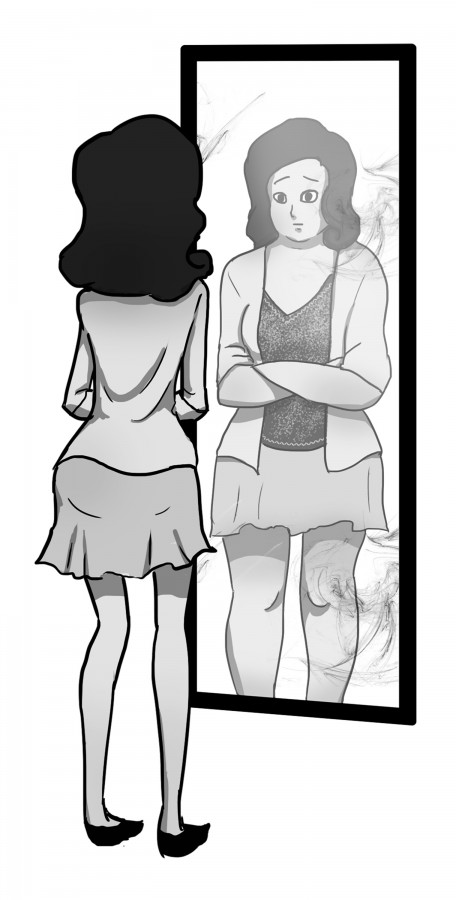Feeling happy. Feeling annoyed. Feeling hungry. These are all options Facebook allows their users to select when sharing their thoughts with the rest of the world. Yet recently the site has included a new addition: feeling fat, accompanied by a chubby-cheeked emoticon. Ignoring the fact that weight is not a feeling, Facebook has exemplified the 21st century concept of body-shaming, a reality that has only been perpetuated by the media and teens behind screens.
Pick up any magazine nowadays and find a bronzed model with flawless skin and smooth hair. Though this picture may incite few reactions in one person, it could provoke waves of self-deprecating behavior in another.
“As a teacher I have noticed when you’re reading or watching a film, everybody brings everything that’s ever happened to them: the way they were raised, their beliefs, their biases, their preferences, their tastes,” English teacher Susan Lilley said. “That explains why you can be sitting next to your best friend, watching a movie, and you might have totally different reactions. We all drag our history with us.”
The institutionalized ideal of beauty has become a standard set by the media, leaving those who feel like they do not meet societal expectations in a pit of insecurity.
In 2004, the BBC found that 90% of teenagers, regardless of gender, were unhappy with their body shape or appearance. It’s obvious that as a society, we have developed a contorted idea of health and beauty. You only have to look at the billboards for seemingly magic weight-loss pills and advertisements for plastic surgeons.
But it’s not just fat-shaming that plagues our society. Thinness is attacked as well.
“A lot of girls, especially over the Internet, will call others anorexic,” sophomore and Ford Models NYC representative Ayla Maugans said. “When someone comments on a photo that they’re anorexic, not only is it shaming their body, but it’s telling them that they have a mental illness. That just takes it a step too far and trivializes something very sad.”
Society’s perception of what beauty should be has created a hostile environment where true illnesses are marginalized and genetic dispositions are deemed “ugly” or “disgusting.”
Yet body-shaming is not exclusive to women. It’s a reality felt by both genders. According to Dr. Jennifer Greenberg, a research director at Massachusetts General Hospital, while men and women are both exposed to unrealistic ideals, men may put more emphasis on them as they often place significant value on physical attractiveness. The media has glorified a muscled, six-packed male physique, causing great insecurity among those who do not embody it.
“As a young male, I don’t think it’s very different for our gender,” sophomore Kyden Payne said.
It’s obvious that there’s a problem. Only two questions remain: how did this happen, and how can we fix it?
The argument stands that underweight models and new editing technology have caused psychological distress among consumers. Yet until a 2013 study by Microsoft, the link between media portrayals of models and the increased appearance of eating disorders could only be hypothesized. According to the International Journal on Eating Disorders, Microsoft found that anorexic models and celebrities featured on websites resulted in an almost two-fold increase in subsequent internet searches and the development of anorexia itself.
It’s no longer a myth. It’s no longer a fear. It’s a fact: the media’s idealized photographs have created an unhealthy populace.
All too often, people take pictures at face value and believe that what they see must be the unaltered truth. Nonetheless, it’s not all black and white.
“I don’t think anyone should wake up and expect themselves to look like one of those models on the cover of the magazine,” Maugans said. “It’s important to understand that these people go through hours and hours of hair and makeup and styling, and then they have people retouching them. And then, there’s the editing.”
A picture in a magazine is more than a snapshot of a moment. It follows hours under a makeup brush and days with a computer editing tool. A 2006 Dove Campaign for Real Beauty commercial depicted the way a woman’s neck could be lengthened, eyes could be enlarged, and face could be narrowed all with enhancement software. When we strive to look like the model on the front cover of Vogue, we set goals that will end in insecurity, for Photoshop and lipstick are not accessible at all times.
Some countries have tried to fix the situation with new policies. The Jerusalem Post reported in 2013 that Israel recently pushed through a law that bans the use of Photoshop to “remake” the images of models in fashion advertising, in order to combat increases in eating disorders.
As a society, we need to realize that what we see is not the whole truth. As a nation, we need to look to policies like Israel’s that limit corporations’ ability to manipulate young minds.
“We need to remember that every body type is a beautiful body,” Maugans said.
It is inexcusable to accuse someone on the Internet of a mental illness. It is horrifying to shame someone for a number on a scale. It is disappointing to log on to Facebook and see “fat” as an option for a mood.
If we shame people for their weight, for something they often cannot control, it is no better than forming prejudices against the color of one’s skin or beliefs. Let’s step up to our expressed values of acceptance and equality for all and embrace people of all cultures, religions and sizes.




